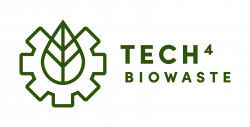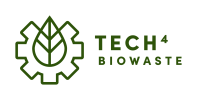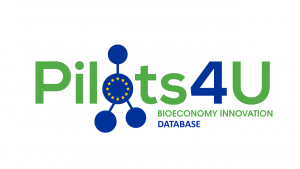Composting
| Technology | |

| |
| Technology details | |
| Name: | Composting |
| Category: | Conversion (Biochemical processes and technologies) |
| Feedstock: | Biowaste in general, Food waste, Garden and park waste (wood, leaves) |
| Product: | Compost |
Composting is a biological process in which micro-organisms convert organic matter such as plant and animal scraps into soil-like material called compost. Compost is easier to handle than manure and other raw organic materials, stores well and is odor-free. Composting is an ancient technology, practiced today at every scale from the backyard compost pile to large commercial operations.
Bioremediation
Bioremediation is different from composting. This techniques are destruction techniques to stimulate the growth of micro-organisms, using the contaminants as a food and energy source. These techniques have been successfully used to remediate soils/sludges & groundwater contaminated by petroleum hydrocarbons, solvents, pesticides, wood preservatives, and other organic chemicals. Oxygen, water & nutrients are added, and the temperature and pH are controlled. The rate microorganisms degrade the contaminants is influenced by: the specific contaminants present, their concentrations, the oxygen supply, moisture, temperature, pH, nutrient supply, bio-augmentation, and co-metabolism. Micro-organisms can be adapted to degrade specific contaminants or enhance the process.
Feedstock
Origin and composition
Composts can be made from most organic by-products. Common feedstocks are poultry, hog and cattle manures, food processing wastes, sewage sludge, municipal leaves, brush and grass clippings, sawdust, and other by-products of wood processing.
Ideally, several raw materials should be mixed together to create the "ideal" range of conditions, which are as follows:
| Condition | Ideal |
|---|---|
| C:N ratios of combined feedstocks | 25-35:1 |
| Moisture content | 45-60 wt.% |
| Available oxygen concentration | >10% or more |
| Feedstock particle size | Variable |
| pH | 6.5-8.0 |
| temperature | 54-60°C |
Pre-treatment
The pre-treatment usually starts with a sizing activity by chipping the feedstock and subsequently the necessary structural material is mixed in. The purpose of the structural material is to prevent the organic material from caking together. The feedstock mixture is also stripped of metals by means of an electromagnet. In preparation for intensive ripening, a homogeneous airy material is obtained.
Process Composting
Composting occurs through the activity of micro-organisms naturally found in soils. Under natural conditions, earthworms, nematodes and soil insects do most of the initial mechanical breakdown of organic materials into smaller particles. Under controlled conditions, composters break down large particles through grinding or chopping. Once optimal physical conditions are established, soil bacteria, fungi, actinomycetes and protozoa colonize the organic material and initiate the composting process. These mesophilic organisms function best at warm temperatures (10-45°C). As temperatures in the compost pile increase, thermophiles (i.e., micro-organisms that thrive at temperatures above 45°C) take over. In the active "thermophilic" phase, temperatures of 54-65°C are reached which is high enough to kill pathogens and weed seeds and to break down phytotoxic compounds (i.e., organic compounds toxic to plants). After the active composting phase, temperatures gradually decline to around 37°C. The mesophiles recolonize the pile and the compost enters the "curing phase". During curing, organic materials continue to decompose and are converted to biologically stable humic substances (i.e., the mature or finished compost). There is no clear defined time for curing. Common practices in commercial composting operations range from one to four months.
In-vessel composting
In-vessel composting generally describes a group of methods that confine the composting materials within a building, container, or vessel.[1]
Open windrow composting
The process of windrow composting is relatively simple: The feedstock is shredded, mixed and placed into windrows along a non permeable surface. The windrows are turned on a regular basis to improve oxygen content, distribute heat to regulate temperature and to distribute moisture.[2]
Process Bioremediation
Bioremediation is a process where biological organisms are used to remove or neutralize an environmental pollutant by metabolic process. The “biological” organisms include microscopic organisms, such as fungi, algae and bacteria, and the “remediation”—treating the situation. Some examples of bioremediation technologies are bioventing, landfarming, bioreactor, composting, bioaugmentation, rhizofiltration, and biostimulation.
Product
The final product is a valuable soil resource named compost. Compost can replace materials like peat and topsoil as seed starters, container mixes, soil amendments, mulches and natural fertilizers.
Post-treatment
In post treatment, the compost is screened at small sizes (up to 12 mm) and any remaining impurities are removed. The coarse fraction is reused in composting as a structural material.
Technology providers
| Company name | Country | Technology subcategory | Technology name | TRL | Capacity [kg/h] | Processable mass [kg] | Feedstock: Food waste | Feedstock: Garden & park waste |
|---|---|---|---|---|---|---|---|---|
| Attero | The Netherlands | - | [Technology name (the "branded name" or the usual naming from company side)] | [9 | - | - | ● | ● |
| Blueotter | Portugal | - | Bioremediation | 4-9 | 3 | - | ● | ● |
| Ekolive | Slovakia, Germany | - | Bioremediation, Bioleaching, producing Biostimulants | 4-9 | - | - | ● | ● |
| Tidy Planet | United Kingdom | - | Rocket Composter | 9 | 20-5000 | - | ● | ● |
Attero
| General information | |||
| Company: | Attero | 
| |
| Country: | The Netherlands | ||
| Contact: | |||
| Webpage: | https://www.attero.nl/ | ||
| Technology and process details | |||
| Technology name: | Technology category: | Conversion (Biochemical processes and technologies) | |
| TRL: | 9 | Capacity: | kg·h-1 |
| Microorganism: | Processable mass: | 300.000.000 kg | |
| Other: | |||
| Feedstock and product details | |||
| Feedstock: | OFMSW | Product: | Soil amendment, biofuel |
Attero is a Dutch industrial scale waste processing company. It has a long history in processing the organic fraction of municipal solid waste (OFMSW), which are further processes at various locations. At first, the OFMSW is digested after which the resulting solid fraction will be composted togther with e.g., twigs. Subsequently, any contaminating component like glas or plastics are removed from the compost using various techniques. The various fractions within the compost are sifted for different applications.
Blueotter
| General information | |||
| Company: | Blueotter | 
| |
| Country: | Portugal | ||
| Contact: | Tel:. +351 219 499 200
Blueotter CIRCULAR circular@blueotter.pt | ||
| Webpage: | https://blueotter.pt/ | ||
| Technology and process details | |||
| Technology name: | Bioremediation | Technology category: | Conversion (Biochemical processes and technologies) |
| TRL: | 4-9 | Capacity: | totalling 28,000 metric tons per year kg·h-1 |
| Microorganism: | not relevant | Processable mass: | 28,000 metric tons per year kg |
| Other: | not relevant | ||
| Feedstock and product details | |||
| Feedstock: | organic waste | Product: | recycled and recovered fractions of soil |
BLUEOTTER provides premium environmental services to its clients and partners through industrial waste recovery and treatment units, operating with maximum environmental responsibility and implementing the best environmental practices and techniques. You may not know the name Blueotter, but you know what we do. We started our group in 2016 when we acquired CITRI and later acquired CME ÁGUAS / PRORESI waste management units, creating a new brand to take waste management to a whole new level of service and environmental progression. In 2019 we expanded further with our acquisition of the non-hazardous activities of EGEO GROUP, renaming it BLUEOTTER CIRCULAR. With this latest acquisition, we can provide our customers more services, including recycling, municipal waste, and sanitation services. We operate on a national level, from Trofa to Algarve. Our goal is to follow the best environmental and management practices in waste sorting and recycling; organic waste treatment; and processing and preparing alternative fuels from waste. We are committed to responding to society´s needs with the best environmental solutions while safeguarding natural resources.
Ekolive
| General information | |||
| Company: | ekolive s.r.o. | 
| |
| Country: | Slovakia /Germany | ||
| Contact: | mail: ekolive(at)ekolive.eu
phone: +49 5251 297 219 0 | ||
| Webpage: | https://ekolive.eu | ||
| Technology and process details | |||
| Technology name: | Bioremediation, Bioleaching, producing Biostimulants | Technology category: | Conversion (Biochemical processes and technologies) |
| TRL: | 4-9 | Capacity: | technology provided without limitations kg·h-1 |
| Microorganism: | Bacteria mix - microlive® | Processable mass: | technology provided without limitations kg |
| Other: | InnoBioTech® for Bioremediation, Bioleaching | ||
| Feedstock and product details | |||
| Feedstock: | Contaminated soil / Minerals | Product: | Bacteria used: microlive® | Nutrition for bacteria: ekocomplex® |
ekolive is the first and leading provider of an EU/ETV certified eco-innovative bioleaching method (InnoBioTech®) for processing waste/minerals/soil using bacteria. This allows new raw material resources to be explored or giving various industrial waste a second life, replacing dangerous mining and processing methods, environmental hazards to be sustainable eliminated, and biostimulants/organic fertilizers to be produced – to replace agrochemicals and increase yields in organic farming as well as to restore the microbiome in the soil. ekolive is ecological, innovative, value-adding; the breadth and contribution of it’s innovative technology to achieving global sustainability goals is exceptional.
Tidy Planet
| General information | |||
| Company: | Tidy Planet Limited | 
| |
| Country: | United Kingdom | ||
| Contact: | Huw Crampton | ||
| Webpage: | https://tidyplanet.co.uk/ | ||
| Technology and process details | |||
| Technology name: | Rocket Composter | Technology category: | Conversion (Biochemical processes and technologies) |
| TRL: | 9 | Capacity: | 20-5000 kg·h-1 |
| Microorganism: | Thermophilic | Processable mass: | Green wastes, animal wastes, food wastes kg |
| Other: | |||
| Feedstock and product details | |||
| Feedstock: | Food Waste | Product: | Compost |
Tidy Planet present the widest range of on-site food waste recycling products on the market, tested and manufactured to the highest quality standards here in the UK – tackling on-site, commercial food waste.
The Rocket Composter is a robust, high quality machine that processes commercial scale food waste and green waste on site, using natures own process of composting. Though Tidy Planet’s range of Rocket Composters go from 20kg up to 5000kg per day, they all follow the same basic principles, optimising and speeding up the natural composting process. Food, green or animal wastes are loaded into the machine over the course of the day, along with woodchip to provide essential carbon and help with aeration. Then, naturally occurring microbes within the process get to work, with the Rocket adding gentle aeration and mixing with controlled air flow to help them thrive. After only 10-14 days, the organic waste comes out of the other end of the machine converted into a valuable resource, an end to end process with minimal energy consumption and maximum environmental benefit.
Open access pilot and demo facility providers
Here we make the link to the Europe-wide network & database of open access multipurpose pilot and demo infrastructures for the European bio-economy.
Unfortunately the Pilots4U database doesn't contain shared facilities for the technology of composting. There is, however, a selection for anaerobic digestion: Pilots4U Database
Patents
Currently no patents have been identified.
References
- ↑ Robert Rynk, 1992: On-Farm Composting Handbook. Plant and Life Sciences Publishing. Robert Rynk (Ed.). Cooperative Extension, June 1992.
- ↑ , 2016: Open Windrow Composting 13/12/2016, Last access 09/03/2023. https://wrap.org.uk/resources/guide/open-windrow-composting#:~:text=The%20process%20of%20windrow%20composting,temperature%20and%20to%20distribute%20moisture.
